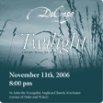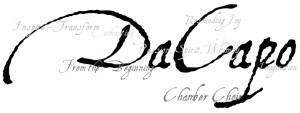
Saturday evening’s DaCapo Chamber Choir performance, entitled Twilight, created a wonderfully transcendent experience. Superlative conducting, disciplined singing, and inspired programming, all combine to a remarkable musical achievement.
A packed house in the acoustically and esthetically pleasing St. John the Evangelist church in Kitchener didn’t hurt.
Twilight is that middle-time, writes conductor Leonard Enns, that gift of repose and reflection. An apt theme for a rainy Remembrance day, it provided a fitting umbrella for the artistic quality of the evening.
Each piece drew on fresh and though provoking poetry, exquisitely illuminated with interpretive music.
Frequently the combination of either broadly melodic unison lines or lush choral harmonies lulled the audience into a sweet, often melancholy, felling. Inevitably, this balance was to be challenged by some kind of musical tention, shedding light on some of life’s more difficult mysteries. This thematic and musical edge pushed the listener toward the sublime.
With A Child’s Prayer (James MacMillan), it was the piercing soprano duo expressing cathartic rage against the senseless murder of school children, juxtaposed with a deep choral change, all providing the necessary bridge between life, death and meaning.
In Canadian Eleanor Daly’s Requiem (the first major work of the performance), there was the juxtaposition of a sweet soprano solo (Sara Martin singing the contemporary poetry of Carolyn Smart) against the choir’s traditional Gregorian “requiem aeternam dona eis.”
The widest expressive range came with the second major work, Jonathan Dove’s secular and programmatic The Passing of the Year. We passed through various seasons and times – sometimes rapturous and billowing, sometimes jovial or sad, even raucous bells were heard bursting “to the wild sky.”
The choir proved adaptable to a diversity of difficult repertoire. There was a quiet confidence evident in these singers which suggested solid preparation and a disciplined, though emotive service to musical expression of the highest quality. There was a refreshing lack of unnecessary vibrato and clean, unified sound throughout. A total of nine soloists throughout the evening (heavily represented by the sopranos) demonstrated the depth of talent rare for this kind of group.
Pianist Catherine Robertson accompanied on the Dove piece with extraordinary skill and artistry.
Enns’ conducting was superb – always passionate, concentrated and intense. On occasion, all it took was a slight hand gesture, a gentle nod, or cue with the eyes to coax the nuanced effort from his choristers. At other times it was a frenetic jabbing, thrusting, and full-body blast. The musical ecstasy in Enns’ overall performance was palpable and infectious.
Four short works added interest and depth to a well-proportioned concert which left the audience nicely satiated. The final send off, a benediction of sorts, was Frank Ticheli’s There Will Be Rest (poetry of Sara Teasdale). This haunting piece evoked themes of trouble and loneliness, only to tentatively resolve to a suggestion of peace and hope. There couldn’t have been a better way to send the audience off into the dark, November night.




